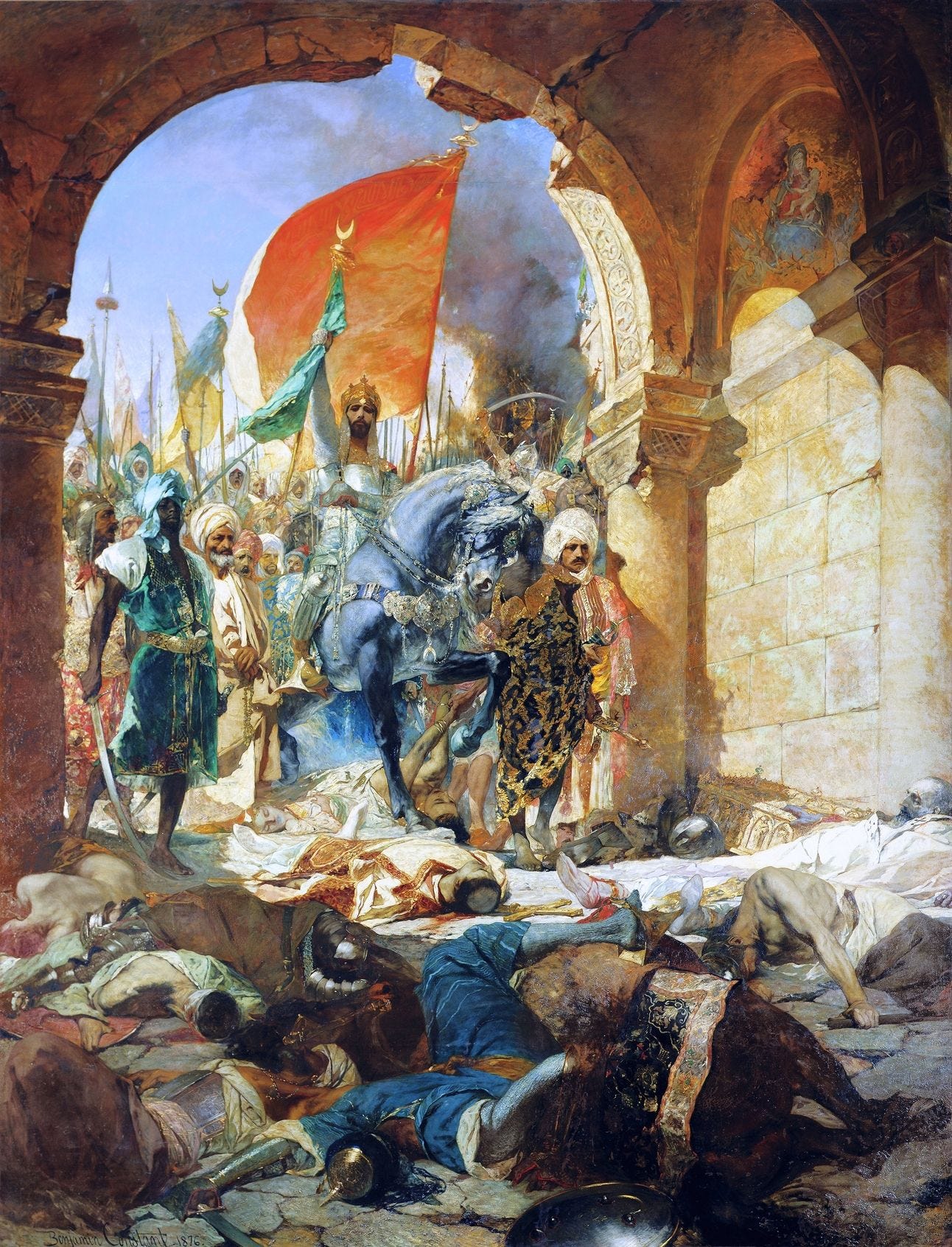What’s This?
I’ve decided to start an ad hoc newsletter.
Why? The social media scene is fragmented, and my website is ancient. I’ll get to updating that when I can. In the meantime, I still want to share what I’m reading, working on, and thinking about, so here I am.
Who am I? Scroll to the bottom if you don’t know - I’d prefer just to get into it. Here’s what I’ve been up to lately.
Malaya’s Ottoman Lodestar

Jean-Joseph Benjamin-Constant, Entry of Sultan Mehmed II in Constantinople, 29 May 1453. Public domain, via Wikimedia Commons
I’ve been writing and talking about why Malaysia’s Islamist party PAS keeps talking about the Ottomans, and how references to the Ottomans work in Malaysian politics.
I’ve had an essay on these references, “Malaysia’s History Wars at the Ballot Box,” published in Inside Story, and I also gave an interview based on the essay to Radio National’s Religion and Ethics Report.
The practice of borrowing Ottoman symbology is not new in Malaya, of course, and here’s an example of my work on how it motivated rebels in an anticolonial uprising in Terengganu, on Malaya’s east coast, in 1928:
Malhi, Amrita (2015). “'We Hope to Raise the Bendera Stambul': British Forward Movement and the Caliphate on the Malay Peninsula,” in Andrew Peacock & Annabel Teh Gallop (eds). From Anatolia to Aceh: Ottomans, Turks, and Southeast Asia, British Academy/Oxford University Press: pp. 221-240.
Contact me if you can’t access a copy.
“Reformati?” - Is Reformasi Dead?
Jacqui Baker has pronounced Indonesian reformasi “dead.”
Meanwhile, in Malaysia, members and supporters of the Perikatan Nasional coalition, now with Mahathir Mohamad as one of its advisers, have also pronounced “reformati” after a court dropped Deputy Prime Minister Ahmad Zahid Hamidi’s 47 graft charges in a Discharge Not Amounting to an Acquittal (DNAA). The term is a play on words that blends the word “mati,” or dead, with “reformasi,” or reform.
They would say that, of course, as they want the government to fall, but it’s not only Perikatan supporters who are “mourning” reformati. It’s also part of Pakatan’s support base, including the youth party MUDA, which has left the coalition.
An observer I always listen to, Wong Chin-Huat, has also told The Australian newspaper Pakatan “has lost its credentials as a reformist bloc.” Will the next step be a pardon for former Prime Minister Najib Razak?
As for me, I can’t think of a narrower way of framing discussions about Malaysia (or Indonesia) than in terms of questions like:
“Is [Third World Country X] getting more or less democratic?”
“When is [Third World Country Y] going to democratise so it can be more exciting, like nearby [Third World Country X]?"
“Why does [Third World Country Y] keep resisting reforms when we have so many great ideas to recommend after studying [Third World Country X]? Is it the politics of race? Could it be corruption? Is it the Islamists?”
Again and again, for 25 years. Stifling!
This way of discussing Malaysia is probably not unique to Australia but it's been a big constraint here. Some work produced within this tight frame is perfectly good, but there are simply lots of other things to say and they shouldn’t have to fight for time and space while the questions above get major sponsorship.
I touched on some problems with the “Malaysia democratisation” narrative in Inside Story a couple of years ago. I also pointed out that Prime Minister Anwar Ibrahim has stopped talking about it and is now focusing more on social and economic repair, in my review of his SCRIPT/MADANI book in New Mandala. This change is in his interest as it gives him more flexibility to survive.
Perhaps this bid for flexibility and Indonesia's own reformati will enable a process of letting go so that whatever happens next in Malaysia can be understood in its wider Asian, Indian Ocean, and global contexts. It shouldn’t remain locked in with Indonesia all the time, where all it gets to be is the slow, resistant country next door.
Who Am I?
For now, you can still check out my old profile on my ancient website - it’s actually not too bad. I will update a couple of details here, though:
For my research, I’m based at the Humanities Research Centre at The Australian National University (ANU) in Canberra; and at the College of Humanities, Arts, and Social Sciences at Flinders University in Adelaide.
I have a job as a senior policy adviser in international development. I’m not speaking here in my employer’s name, or purporting to represent it in any way. I might link or talk about issues touching on my work but consider that general discussion only.
I do other work as a consultant. Yes, you could hire me. I can show you my bona fides, discuss terms, etc. No, I won’t put your logo up on my website. Yes, you will have to pay.
I’ll be testing out a few options for how to present this newsletter - expect it to change in appearance, perhaps I’ll include ads, maybe I’ll change the host, etc. I don't want to overpromise, so let's say I'll write these things as regularly as I can manage.
Tell people about this newsletter
Yes, you can forward this email to your friends and networks! In fact, you’d be doing me a favour. The sign-up link is right here.


